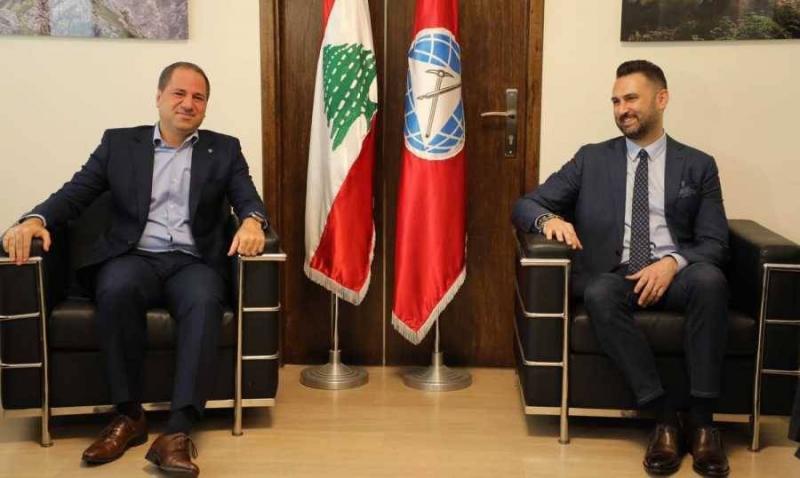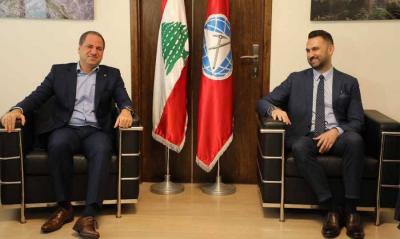Lebanese opposition forces, during their meetings that included the "Free Patriotic Movement" and the "Democratic Gathering" led by Timor Walid Jumblatt, have reached a common point in renewing their consensus on nominating former Minister Jihad Azaur for the presidency. This comes despite their differences regarding the dialogue call initiated by Parliament Speaker Nabih Berri, which was rejected by the "Lebanese Forces" and the "Kataeb" party, as well as several MPs belonging to the "Change Forces."
The convergence of these parties on supporting Azaur's nomination is in anticipation of Berri's next step, whether it be setting a date for the dialogue or postponing it for a while. This is particularly significant as the expectations regarding the distinct position of Maronite Patriarch Bechara al-Rahi, who supports the dialogue, are not accurate as long as the monthly statement from the Maronite bishops' council did not mention the topic of dialogue, focusing instead on calling MPs to fulfill their duty to elect a president.
Opposition sources noted that the bishops' council not addressing dialogue has cut off any hopes that al-Rahi's distinct stance would inevitably lead to a rift between Bkirki and the leader of the "Lebanese Forces," Samir Geagea, who managed to alleviate the tensions through his communication with al-Rahi. This created a sense of relief expressed by "Kataeb" and "Forces" MPs during their meeting with the "Democratic Gathering" in the presence of Jumblatt.
The meeting, which began between Geagea and Jumblatt, later expanded to include MPs representing the "Forces,” the "Renewal" bloc, and several change-oriented MPs, discussed Berri's call for dialogue from a perspective of difference, as the "Democratic Gathering" supports it and does not favor boycotting presidential election sessions or those related to essential legislation. Nevertheless, their disagreement does not change their presidential choices, which will be present at the dialogue table if Berri resolves the matter and sets a date for it.
In this context, "Asharq Al-Awsat" reported from parliamentary sources that Timor Jumblatt began the meeting, the first of its kind between opposition forces and the "Democratic Gathering," by saying: "If we are called to a session to elect a president, we will maintain our position on nominating Azaur.”
Parliamentary sources quoted Jumblatt as stating: "We will not give up our nomination of Azaur in the absence of any settlement that results in electing a president who does not challenge any party and has the capability to unite the Lebanese." He emphasized that there is no party capable of delivering its candidate, and even if they managed to do so, they would face difficulties in managing the country's affairs amid deep divisions.
It was confirmed that the "Democratic Gathering" does not intend to change its position in favor of a president belonging to a specific political faction, referring to the unpreparedness of the "Gathering" to elect former MP Sleiman Frangieh from the "Maraa" party, noting, "We will record this position when a date is set to initiate the dialogue."
Additionally, it was indicated that the meeting between the opposition and the "Democratic Gathering" contributed to clearing the air, irrespective of their differences regarding the dialogue call. Jumblatt expressed a wish for the opposition to handle Berri's dialogue invitation with less intensity, emphasizing that nothing prevents the clarification of several matters related to the dialogue, primarily who sponsors the dialogue, how long its sessions will last, and if it is possible to shorten them as long as each side remains with its candidate. The deputies noted that in such a scenario, it would suffice to record positions that would be present in successive election sessions unless a consensus candidate is agreed upon.
Conversely, a number of deputies, according to the same sources, asserted that there are no preconditions for the dialogue, stating, "For our part, we will not change our presidential choices," which explains "our continued consensus on supporting Azaur's nomination." They reiterated their rejection of dialogue as a means to elect a president, as it is considered unconstitutional, or to limit its agenda to discussing how to elevate Frangieh to the presidency.
These deputies questioned whether the call for dialogue stems from an effort to find a president outside the political alignments. They also inquired whether "Hezbollah" is willing to meet them halfway or if it intends to facilitate the election only if the required number of MPs is secured for electing Frangieh. While these deputies do not oppose bilateral dialogues to avoid turning the dialogue into an assembly of the largest number of MPs, they are well aware that it will not achieve any progress.
Thus, they argue that if dialogue takes place, it will not lead to a change in positions, as Azaur's supporters, regardless of those who may abstain from participating in the dialogue, will not change their stance, being convinced that their candidate will make progress over his competitor Frangieh. They believe that reliance on centrist MPs to support the latter may not be accurate unless they reconsider their non-involvement in political alignments.
Therefore, limiting the presidential competition to Frangieh and Azaur may not be correct in light of regional and international support for Army Chief General Joseph Aoun, although he has not declared his candidacy and recently met with the head of the "Loyalty to the Resistance" bloc, MP Mohammed Raad.
Is their meeting intended to offer condolences for the martyrdom of the two officers? Or does it extend beyond that to send a message to MP Gebran Bassil urging him to clarify his position in agreement with "Hezbollah" by joining Frangieh's supporters? This is particularly relevant since there are no blemishes in General Aoun's relationship with the Shiite duo, following a phase of positive normalization, which worries Bassil, whose priority is to prevent Aoun from reaching the presidency.




